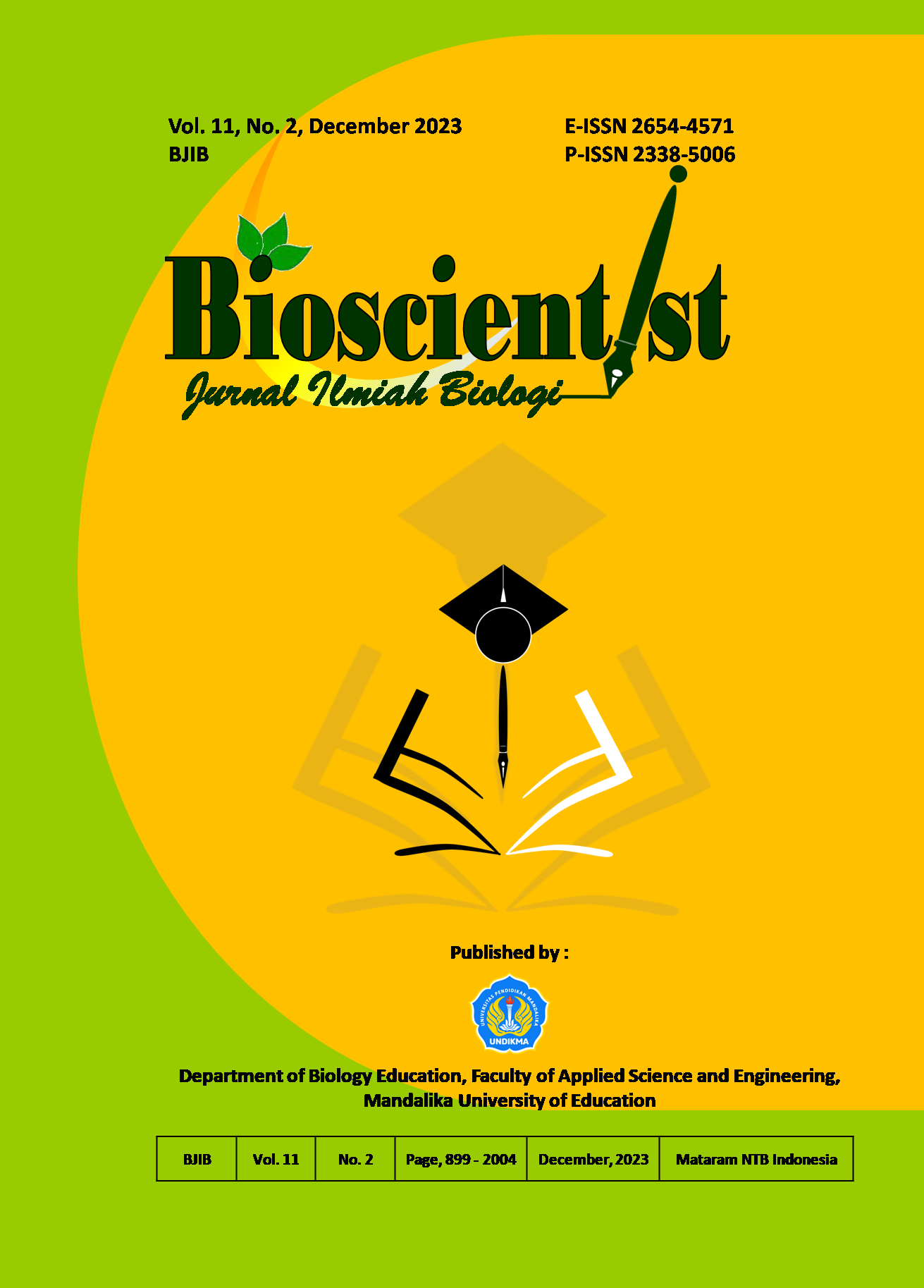Kompatibilitas pada Persilangan Self Anggrek Dendrobium aphyllum
DOI:
https://doi.org/10.33394/bioscientist.v11i2.9376Keywords:
Dendrobium aphyllum, Compatibility, Self- Cross.Abstract
Indonesia has a very rich biodiversity, one of which is the genetic diversity of orchid species. Preservation and propagation of orchids are always carried out because they have many benefits and the availability of orchid germplasm is always there. Therefore, this research aims to test the compatibility of the Dendrobium aphyllum orchid through self-crossing. The crossing method used is self-crossing, namely crossing flowers in the same flower arrangement. The cross begins by taking 100 flowers, then each flower takes its pollinia and inserts it into the stigma hole of the other flower. After the crossing is carried out, observations are continued once a week and if fruit is successful then observations are carried out once a month. The results of the research showed that the percentage of flowers that fell off was 81% so the number of fruits that were formed until they were physiologically ripe was 8. In accordance with the research data obtained, the success of the cross shows that the level of self-cross compatibility is relatively low namely 8%, and it can be concluded that the nature of the cross is incompatible (crosses below 30%).References
Agusta, H., Santosa, E., Dulbari., Guntoro, D., & Zaman, S. (2022). Continuous Heavy Rainfall and Wind Velocity During Flowering Affect Rice Production. AGRIVITA : Journal of Agricultural Science, 44(2), 290-302. http://doi.org/10.17503/agrivita.v44i2.2539
Andana, D. S., Jannah, H., & Safnowandi. (2023). Pemanfaatan Bintil Akar Kacang Tanah (Arachis hypogaea) sebagai Pupuk Biologi untuk Pertumbuhan Bibit Cabai Rawit (Capsicum frutescens) dalam Upaya Penyusunan Petunjuk Praktikum Fisiologi Tumbuhan II. Biocaster : Jurnal Kajian Biologi, 3(1), 1-10. https://doi.org/10.36312/bjkb.v3i1.145
Arruum, Z. S., & Waluyo, B. (2021). Keberhasilan dan Kompatibilitas Penyerbukan Sendiri dan Silang pada Hibridisasi Interspesfik Ciplukan (Physalis spp). Jurnal Agro, 8(1), 84-99. https://doi.org/10.15575/9368
Cakova, V., Bonte, F., & Lobstein, A. (2017). Review Dendrobium: Sources of Active Ingredients to Treat Age-Related Pathologies. Aging and Disease, 8(6), 827-849. http://doi.org/10.14336/AD.2017.0214
Crall, J. D., Brokaw, J., Gagliardi, S. F., Mendenhall, C. D., Pierce, N. E., & Combe, S. A. (2020). Wind Drives Temporal Variation in Pollinator Visitation in a Fragmented Tropical Forest. Biology Letter, 16(4), 1-6. https://doi.org/10.1098/rsbl.2020.0103
da Silva, J. A. T., Zeng, S., Jr, R. F. G., Dobranszki, J., Cardoso, J. C., & Vendrame, W. A. (2014). In Vitro Conservation of Dendrobium Germplasm. Plant Cell Reports, 33(9), 1413-1423. http://doi.org/10.1007/s00299-014-1631-6
Darmawati, I. A. P, Astarini, I. A., Yuswanti, H., & Fitriani, Y. (2021). Pollination Compatibility of Dendrobium spp. Orchids from Bali, Indonesia, and the Effects of Adding Organic Matters on Seed Germination under in Vitro Culture. Biodiversitas : Journal of Biological Diversity, 22(5), 2554-2559. https://doi.org/10.13057/biodiv/d220513
De, L. C., & Pathak, P. (2020). Good Agricultural Practices of Dendrobium Orchids. Journal Orchid Society India, 34(1), 35-43.
de Faria, R. T., Stegani, V., Bertoncelli, D. J., Alves, G. A. C., & de Assis, A. M. (2018). Substrates for the Cultivation of Epiphytic Orchids. Semina: Ciências Agrárias, 39(6), 2851-2866. https://doi.org/10.5433/1679-0359.2018v39n6p2851
Hartati, S. (2015). Analisis Keragaman Genetik Tetua dan Hasil Persilangan Anggrek Hitam (Coelogyne pandurata Lindl.). Disertasi. Universitas Sebelas Maret.
Hartati, S., Cahyono, O., & Lestari, N. P. (2017). Uji Tingkat Kompatibilitas dan Umur Mekar Bunga pada Persilangan Intergenerik Anggrek Vanda sp dan Phalaenopsis sp. Caraka Tani : Journal of Sustainable Agriculture, 32(1), 24-28. https://doi.org/10.20961/carakatani.v32i1.15924
Jayanti, R. P. D. (2021). Uji Kompatibilitas Persilangan Interspesies dan Resiprok Anggrek Dendrobium. Skripsi. Universitas Islam Malang.
Lestari, N. K. D., & Deswiniyanti, N. W. (2017). Kompatibilitas Persilangan Self dan Interspesifik Anggrek Phalaenopsis pulcherrima (Lindl.) J. J. Smith. Jurnal Media Sains, 1(1), 32-36.
Lestari, N. K. D., Deswiniyanti, N. W., Sari, N. K. Y., Murna, I. M., & Rizqy, A. N. (2023). Morphological Relationships and Cross Compatibility of Seven Dendrobium Species in Indonesia. Biodiversitas : Journal of Biological Diversity, 24(6), 3550-3558. https://doi.org/10.13057/biodiv/d240654
Lestari, N. K. D., Deswiniyanti, N. W., & Virginia, N. M. (2022). Karakter Morfologi Bunga Anggrek Dendrobium Hibribida Hasil Persilangan Tetua Anggrek Spesies Dendrobium stratiotes Rchb.f. In Prosiding Seminar Ilmiah Nasional Teknologi, Sains, dan Sosial Humaniora (pp. 427-434). Denpasar, Indonesia: Universitas Dhyana Pura.
Li, C., Dong, N., Zhao, Y., Wu, S., Liu, Z., & Zhai, J. (2021). A Review for the Breeding of Orchids : Current Achievements and Prospects. Horticultural Plant Journal, 7(5), 380-392. https://doi.org/10.1016/j.hpj.2021.02.006
Manzano, E. D. l. R., Andrade, J. L., Zotz, G., & Reyes, C. (2014). Epiphytic Orchids in Tropical Dry Forests of Yucatan, Mexico - Species Occurrence, Abundance and Correlations with Host Tree Characteristics and Environmental Conditions. Flora, 209(2), 100-109. http://doi.org/10.1016/j.flora.2013.12.002
Maulida, D., Pradana, O. C. P., & Erfa, L. (2022). Pollination Compatibility of Dendrobium Polinela Lampung, and The Effect of Media Composition with Coconut Water on Seed Germination In Vitro. IOP Conference Series : Earth and Environmental Science, 1012(1), 1-9. http://doi.org/10.1088/1755-1315/1012/1/012065
Niu, S., Huang, J., Xu, Q., Li, P., Yang, H., Zhang, Y., Zhang, G., Chen, L., Niu, Y., Luo, Y., & Liu Z. (2018). Morphological Type Identification of Self-Incompatibility in Dendrobium and its Phylogenetic Evolution Pattern. International Journal of Molecular Sciences, 19(9), 1-18. http://doi.org/10.3390/ijms19092595
Pridgeon, A. M., Cribb, P. J., Chase, M. W., & Rasmussen, F. N. (2014). Genera Orchidacearum Volume 6 : Epidendroideae. Oxford: Oxford University Press.
Putri, K. P., & Pramono, A. A. (2013). Perkembangan Bunga, Buah, dan Keberhasilan Reproduksi Jenis Saga (Adenanthera pavonina L.). Jurnal Penelitian Hutan Tanaman, 10(3), 147-154. https://doi.org/10.20886/jpht.2013.10.3.147-154
Ramdhini, D. W., & Jannah, M. (2021). Analisis Filogenetik Anggrek Dendrobium Berdasarkan Sekuen ITS rDNA. Bio-Sains : Jurnal Ilmiah Biologi, 1(1), 8-12. https://doi.org/10.6084/m9.figshare.23564679
Suza, W., & Lamkey, K. (2023). Crop Genetics. Iowa: Libre Text.
Wang, S., Viswanath, K. K., Tong, C. G., An, H. R., Jang, S., & Chen, F. C. (2019). Floral Induction and Flower Development of Orchids. Frontiers in Plant Science, 10(1), 1-15. https://doi.org/10.3389/fpls.2019.01258













